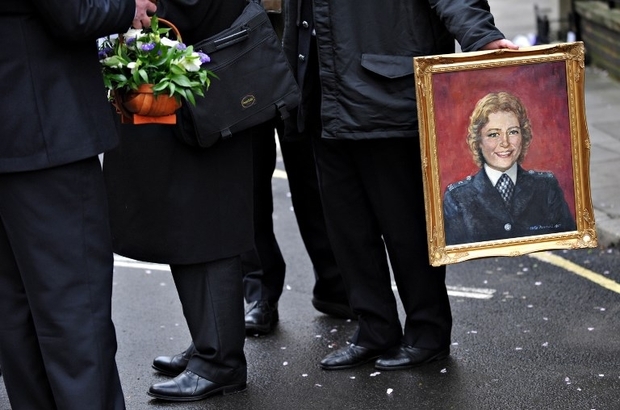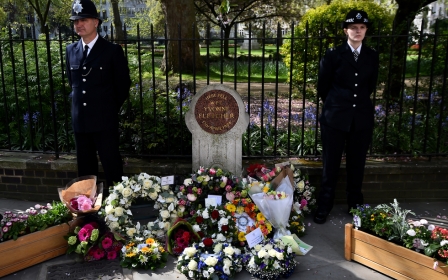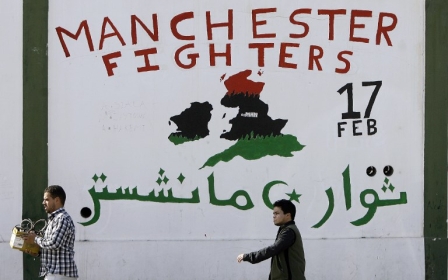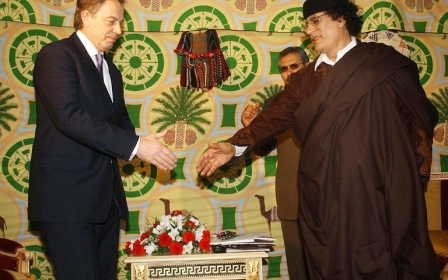Dropping Yvonne Fletcher's case is part of a trend: MI6 running British justice into a ditch

An attack on the police “is an attack on the fundamental basis of our society,” said then home secretary Theresa May in 2013. So she proposed a simple policy: kill a cop, get sent down for the rest of your days. “Life should mean life,” she declared, “for anyone convicted of murdering a police officer.”
I know a fair bit about situations where MI6 obstruct British justice and wrongdoers walk free, because I represent another woman attacked by Gaddafi’s thugs
Except it doesn’t. Last week, the Crown Prosecution Service handed the jailhouse keys to the lead suspect in one of Britain’s most notorious murder cases - the 1984 shooting of WPC Yvonne Fletcher outside the Libyan embassy in London. The reason given was an unspecified risk to "national security".
It looks like MI6 refused to cooperate with police, and so prosecutors, rather than persist in Fletcher’s name, threw up their hands. Whitehall sources admit “Number 10 was involved” in discussions before prosecutors pulled the case. “Life,” it turns out, really means a comfortable retirement in a mock Tudor in Reading.
Other theories have swirled since the announcement. Some said it was to spare the blushes of MI6 and GCHQ for having intercepted intelligence about likely violence at the demonstration but not passed it on. Others say it was to conceal that the suspect was an MI6 asset gone rogue.
These are plausible, but they also smack of pretext. Could British security not have withstood knowing that the UK (or US) could eavesdrop on Libyan spies in the 1980s? That MI6 recruits assets, a process that sometimes goes sour?
Letting wrongdoers walk
I know a fair bit about situations where MI6 obstruct British justice and wrongdoers walk free, because I represent another woman attacked by Gaddafi’s thugs.
In 2004, my client, Fatima Boudchar, was kidnapped, while four months pregnant, and delivered to Libya in a joint CIA-MI6 operation
In 2004, my client, Fatima Boudchar, was kidnapped, while four months pregnant, and delivered to Libya in a joint CIA-MI6 operation. Files found after Tripoli fell in 2011 exposed the intelligence plot to hand her and her husband, then a senior anti-Gaddafi dissident, to the dictator. Last June, prosecutors declined to charge the lead suspect in her abduction as well, saying the evidence was insufficient. Fatima and her husband are now fighting in court to have the CPS’s decision overturned.
In both cases, we’ve seen MI6 driving court cases from the backseat - and running British justice into a ditch. Met detectives believe they know who shot LPC Fletcher; their official statement is virtually spit through the teeth: “We believe our investigation has identified enough material to identify those responsible for WPC Fletcher’s murder….However the key material has not been made available for use in court …. for reasons of national security.”
Police are understandably incensed. Fletcher was 25 when the assassin’s bullet felled her. Standing at her side as her life ebbed away was her 22-year-old fiancé, PC Michael Liddle. Fatima survived her ordeal, but her baby, born in the dictator’s shadow, was delivered weighing just four pounds.
Police also disputed prosecutors’ decision in Fatima’s case - they sent a file of over 28,000 pages to the CPS and recommended a criminal charge. Still the CPS refused. The real problem, one suspects, was that the lead suspect was Sir Mark Allen, MI6’s head of counterterrorism at the time.
Sir Mark brokered the “Deal in the Desert,” the grand bargain in which Gaddafi agreed to give up his weapons programmes in exchange for an end to sanctions. We now know the deal also included the abduction of dissidents and their families. For his pains, Sir Mark was knighted in 2005. Fatima was just collateral damage in MI6’s plan; now, so too is justice for Fletcher.
Who is running the show?
The two cases may be more closely linked yet: one report suggests intelligence officers offered Fletcher’s killers amnesty as part of the very same deal. Counsel for the Libyan suspect says he was given an IRA-style “comfort letter” in 2002. If the suspect is free today because a senior MI6 officer - whether Sir Mark or another - promised he would never be hauled in front of a British jury, the road to entente with Gaddafi was paved with more blood than even we realised.
If the suspect is free today because a senior MI6 officer promised he would never be hauled in front of a British jury, the road to entente with Gaddafi was paved with more blood than even we realised
Fatima’s and Fletcher’s cases are part of a disturbing trend: court cases of immense public importance where the security services, not the Crown, seem to have the final word. This pattern attracted criticism from the Lord Chief Justice Thomas during a recent terrorism trial, who fumed at the prosecution: “It cannot be for the security services to say: ‘Well we may not cooperate’, because that would suggest that they are not subject to the rule of law.”
Just so. And yet, we see Britain’s most senior prosecutors rolling over in the face of intelligence obstructionism again and again. Who is really running the show?
To be clear: I believe that, like anyone, the suspect in the Fletcher shooting deserved a vigorous defence and a fair trial. So did Sir Mark, the man whom I believe helped abduct my pregnant client and her husband. These ideals separate us from regimes like Gaddafi’s. Yet I strain to understand the values that say that these men should never face a British jury.
Fletcher gave her life keeping the peace at a protest against a hateful dictator. What are Fletcher’s successors on the beat defending, what are our intelligence personnel protecting, if not our British way of life - including British justice?
When MI6’s complaints tilt the scales of British justice, something is deadly wrong. Our prosecutors have shown an astonishing lack of spine when facing down the security state. The policeman who held LPC Fletcher as she died says he is contemplating a private prosecution. I hope someone will stand up for her, as my legal team is duty bound to do for Fatima and her husband.
The lord chief justice was right. The security services cannot be above the law. When MI6 flouts that principle to avoid awkward headlines, it is not just the families of Yvonne Fletcher or of Fatima Boudchar who suffer. Our whole society is poorer for it.
- Cori Crider directed the Abuses in Counter-Terrorism team at the NGO Reprieve from 2009-16. As a lawyer she has represented Guantánamo prisoners, victims of "extraordinary rendition," and survivors of drone attacks. She still represents the Belhaj family, and writes as a freelance journalist on the excesses of the national security state. Her writing appears in the Guardian, Reuters, Al Jazeera, the Independent, CNN, Newsweek, and the New York Daily News.
The views expressed in this article belong to the author and do not necessarily reflect the editorial policy of Middle East Eye.
Photo: A police officer holds a portrait of the late PC Yvonne Fletcher before a ceremony to mark the 25th anniversary of her death in St James Square, in London, on 17 April 2009 (AFP)
New MEE newsletter: Jerusalem Dispatch
Sign up to get the latest insights and analysis on Israel-Palestine, alongside Turkey Unpacked and other MEE newsletters
Middle East Eye delivers independent and unrivalled coverage and analysis of the Middle East, North Africa and beyond. To learn more about republishing this content and the associated fees, please fill out this form. More about MEE can be found here.






